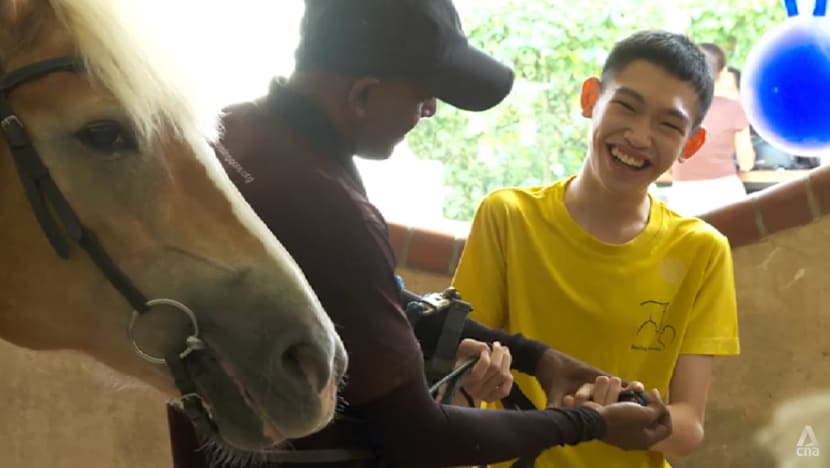Health
Animals Transform Mental Health Care in Singapore’s Therapies

Nineteen-year-old Kwok Wei Hao, who has Angelman syndrome, finds solace in the presence of horses, which serve as both companions and therapeutic aids. For him, riding not only enhances his motor skills and balance but also provides a calming influence. This experience is part of a burgeoning field known as animal-assisted intervention, where trained animals assist individuals in managing stress, trauma, and anxiety.
In Singapore, organizations like Healing Horses Singapore have witnessed a significant increase in demand for these therapies, with a reported rise of about 70 percent over the past two years. This surge is largely attributed to heightened awareness of mental health issues. “It’s not like regular therapy in an indoor setting. We are always outdoors interacting with animals,” said Chithra Rogers, the director of Healing Horses. She noted that even children exhibiting aggressive behavior often become calm when they are with the horses. The animals are trained to adapt to sudden movements or outbursts, and each horse is given time to rest between sessions to ensure their well-being.
Despite the benefits, some parents express concerns regarding safety, particularly when their children exhibit challenging behaviors. To mitigate these worries, each therapy session is supervised by a team of three to four trained staff members.
Global Growth of Animal-Assisted Therapy
The global pet therapy market is projected to expand from S$331 million (approximately US$256 million) in 2024 to S$477 million by 2030, driven by increasing awareness and the mental health challenges arising from the pandemic. In Asia, more hospitals and social service agencies are adopting animal-assisted programs to supplement traditional counselling and rehabilitation methods.
In Japan, for instance, such therapies gained traction during the COVID-19 pandemic as a response to social isolation. Meanwhile, in South Korea, dogs have been utilized to assist patients with dementia and other conditions. In Singapore, the recognition of animal-assisted therapy as a valid form of care is also gaining momentum. A 2015 study indicated that animal therapy significantly alleviates depression symptoms by reducing stress hormones and enhancing mood-related chemicals.
Organizations like Equal have also reported success, with over 820 individuals benefiting from their animal-assisted programs in the past year, marking a nearly 14 percent increase within just twelve months. Their recent initiative, “Haydays with Horses,” involves bringing miniature horses to nursing homes and active aging centers, where they engage with and uplift seniors to enhance their mental and physical well-being.
Challenges Facing Animal-Assisted Programs
Despite the rising demand, challenges persist for organizations like Healing Horses. One significant hurdle is the lack of adequate space. The social enterprise currently operates out of the National Equestrian Centre but has not yet secured a permanent location. Rising rental costs pose an ongoing issue, and funding is needed to reach lower-income families. For instance, clients like Wei Hao previously attended therapy sessions three times a week but have had to pause since March 2023 due to financial constraints. His condition has worsened, and his family is eager to resume his sessions when possible.
The non-profit organization Dogtors, which deploys approximately 65 therapy dogs and their handlers to provide comfort and companionship to seniors, faces its own set of challenges. Founder Adele Lau noted that while funding has improved since the organization’s inception in 2022, there are still issues with public perception. “Handlers sometimes face criticism from the public for bringing dogs into certain spaces,” she explained. Furthermore, misconceptions about therapy dogs persist, with some believing that all dogs can perform therapy work or that sessions merely involve playing with them.
In reality, each program is meticulously designed to meet clients’ therapeutic objectives. Lau emphasized the importance of training handlers to recognize signs of stress in their dogs, prioritizing the animals’ welfare during visits. For example, instead of allowing seniors to hold small dogs—which may cause discomfort for the animals—handlers are encouraged to use alternative methods, such as placing the dogs on chairs.
The Role of Animals in Mental Health Support
Mental health experts advocate for the integration of animal interactions in traditional therapy approaches. Conventional therapy can often be overwhelming and distressing, delving into sensitive subjects. Christine Chiew, senior head of youth services at the Singapore Association for Mental Health, noted that animals’ non-judgmental nature can help young people feel more comfortable. Unlike humans, animals do not exhibit facial expressions or tones that may be interpreted as critical, allowing youths to open up more freely.
In an increasingly digital age, many young people find face-to-face interactions challenging. Animal-assisted programs can provide a valuable alternative, aiding in the development of social skills, strengthening family bonds, and supporting overall mental wellness, even for those not currently undergoing therapy.
As the landscape of mental health care evolves, the role of animals in therapeutic settings is becoming increasingly significant, offering a gentle and effective means of support.
-

 Business5 months ago
Business5 months agoKenvue Dismisses CEO Thibaut Mongon as Strategic Review Advances
-

 Lifestyle5 months ago
Lifestyle5 months agoHumanism Camp Engages 250 Youths in Summer Fest 2025
-

 Sports5 months ago
Sports5 months agoDe Minaur Triumphs at Washington Open After Thrilling Comeback
-

 World3 months ago
World3 months agoSouth Korea’s Foreign Minister Cho Hyun to Visit China This Week
-

 Sports5 months ago
Sports5 months agoTupou and Daugunu Join First Nations Squad for Lions Clash
-

 Top Stories5 months ago
Top Stories5 months agoColombian Senator Miguel Uribe Shows Signs of Recovery After Attack
-

 World5 months ago
World5 months agoASEAN Gears Up for Historic Joint Meeting of Foreign and Economic Ministers
-

 Health5 months ago
Health5 months agoNew Study Challenges Assumptions About Aging and Inflammation
-

 Business3 months ago
Business3 months agoStarling Bank Plans Secondary Share Sale, Targeting $5.4 Billion Valuation
-

 Business5 months ago
Business5 months agoOil Prices Surge Following New EU Sanctions on Russia
-

 Entertainment5 months ago
Entertainment5 months agoDetaşe-Sabah Violin Ensemble Captivates at Gabala Music Festival
-

 Entertainment5 months ago
Entertainment5 months agoBaku Metro Extends Hours for Justin Timberlake Concert









